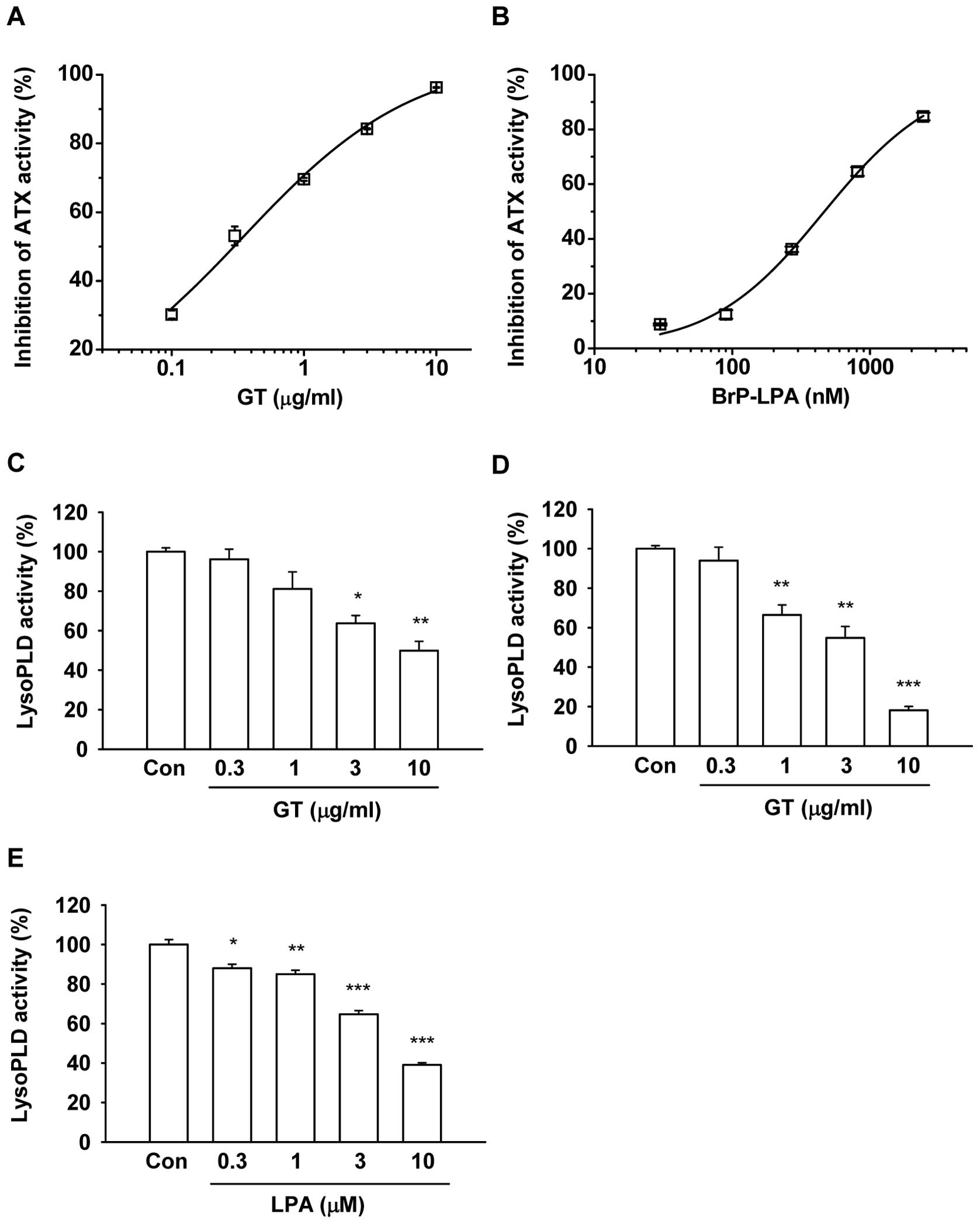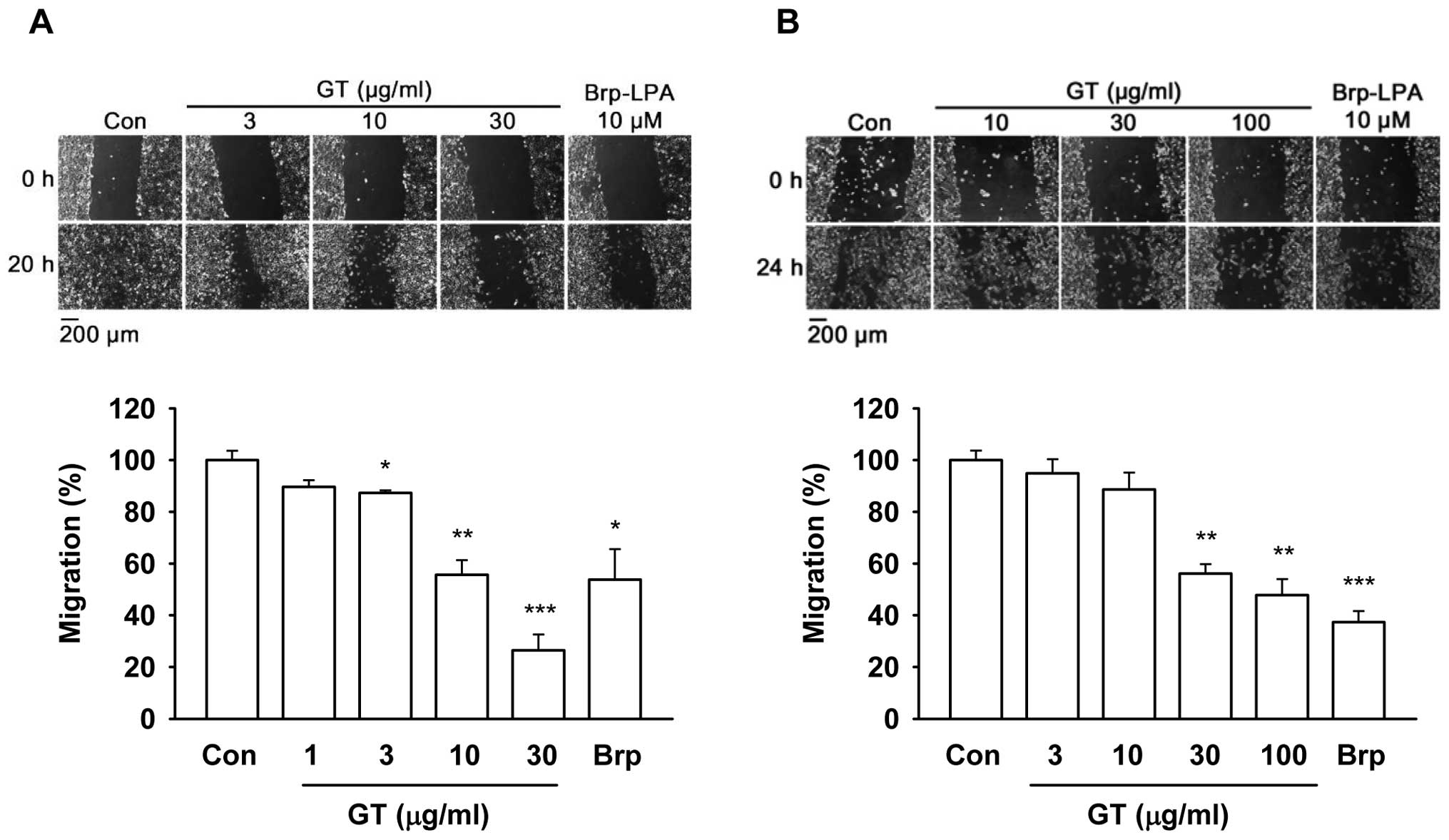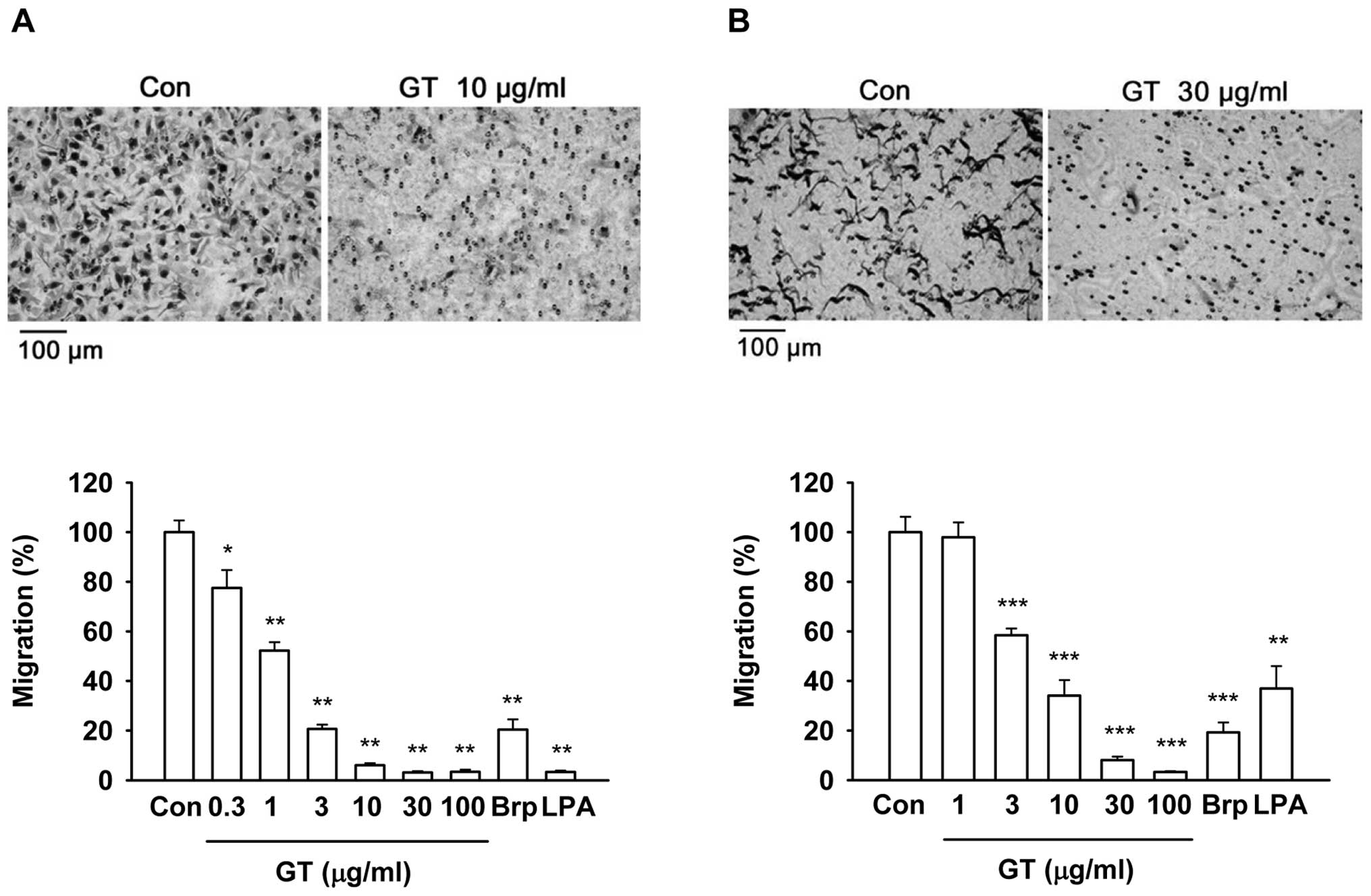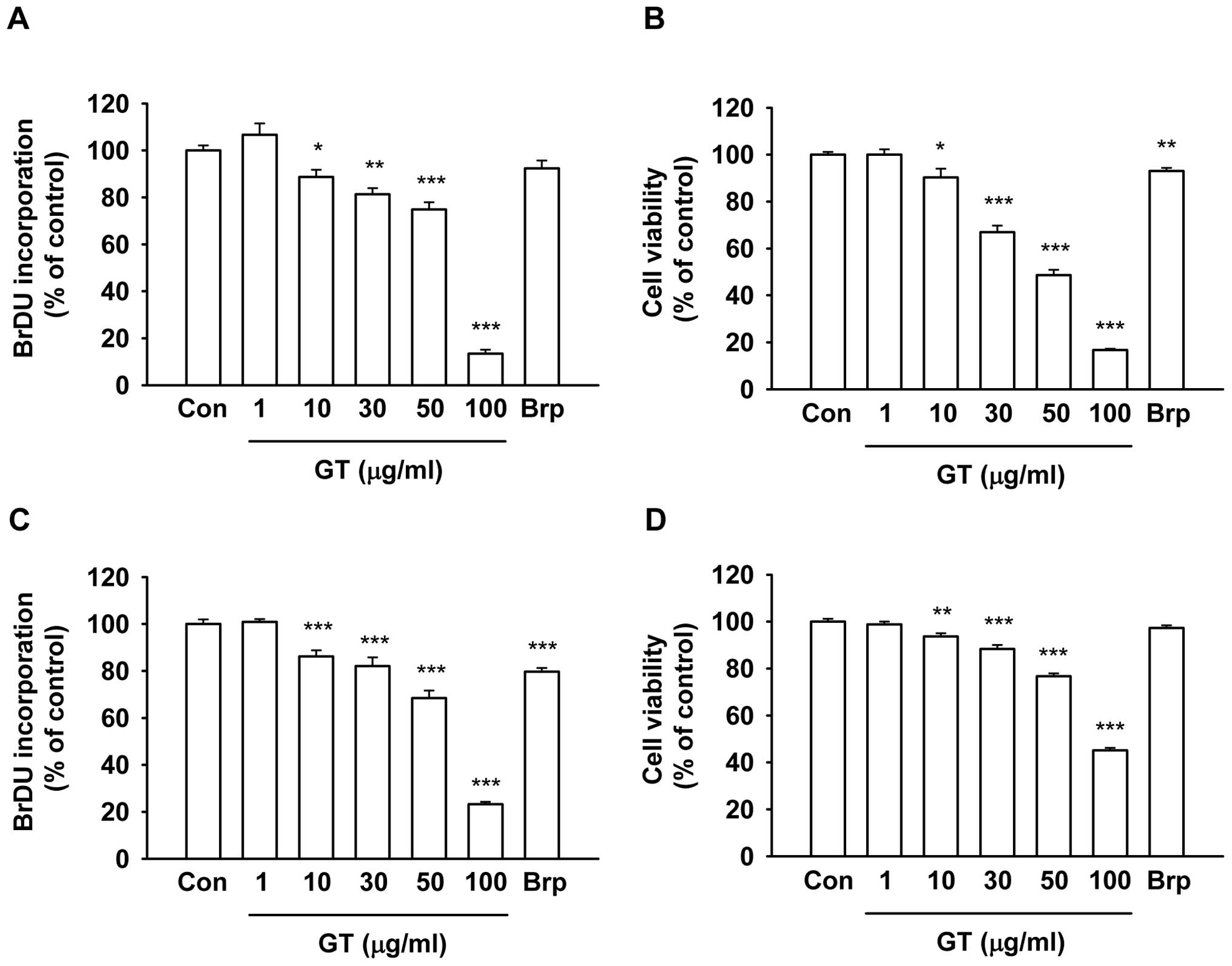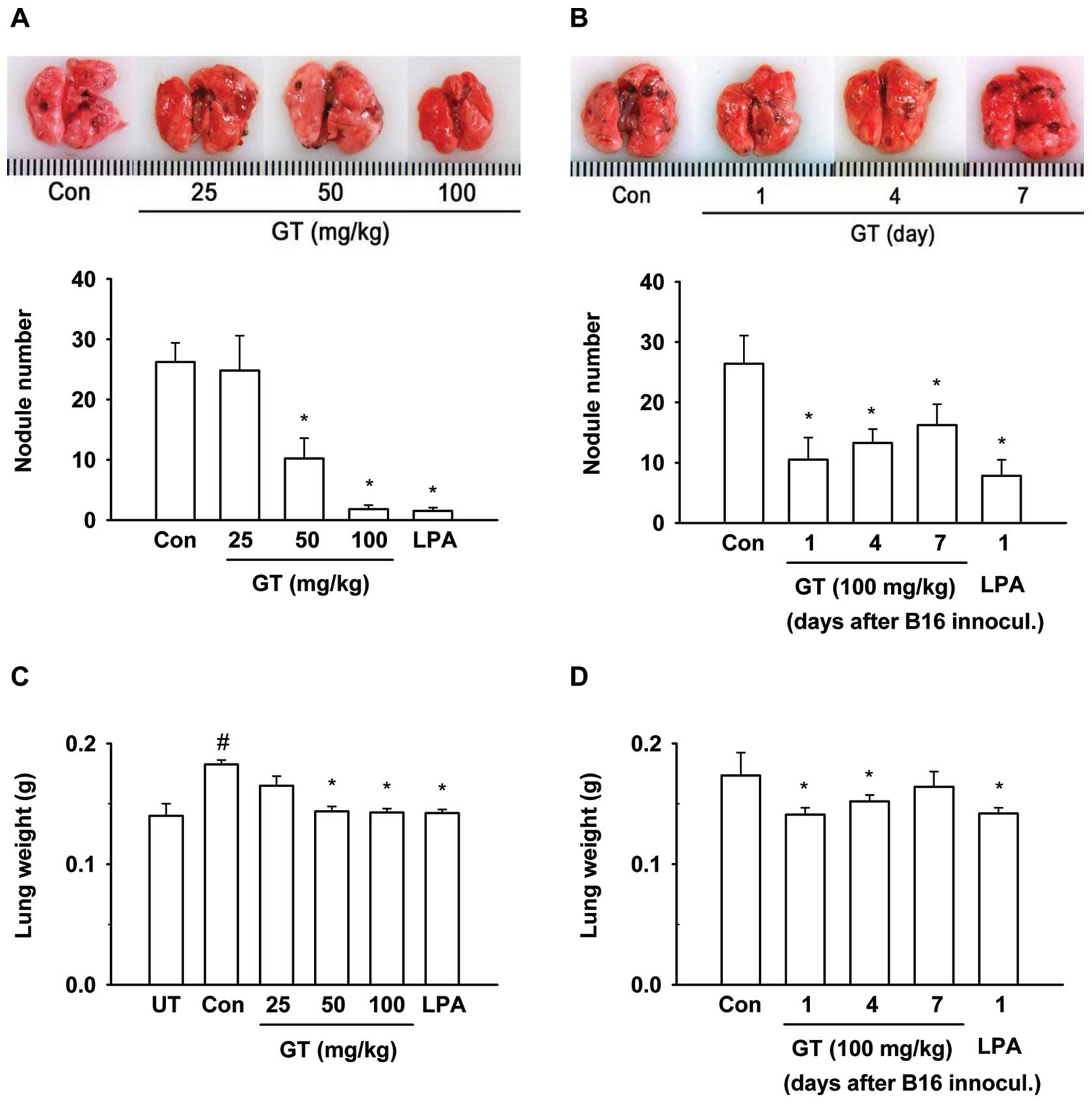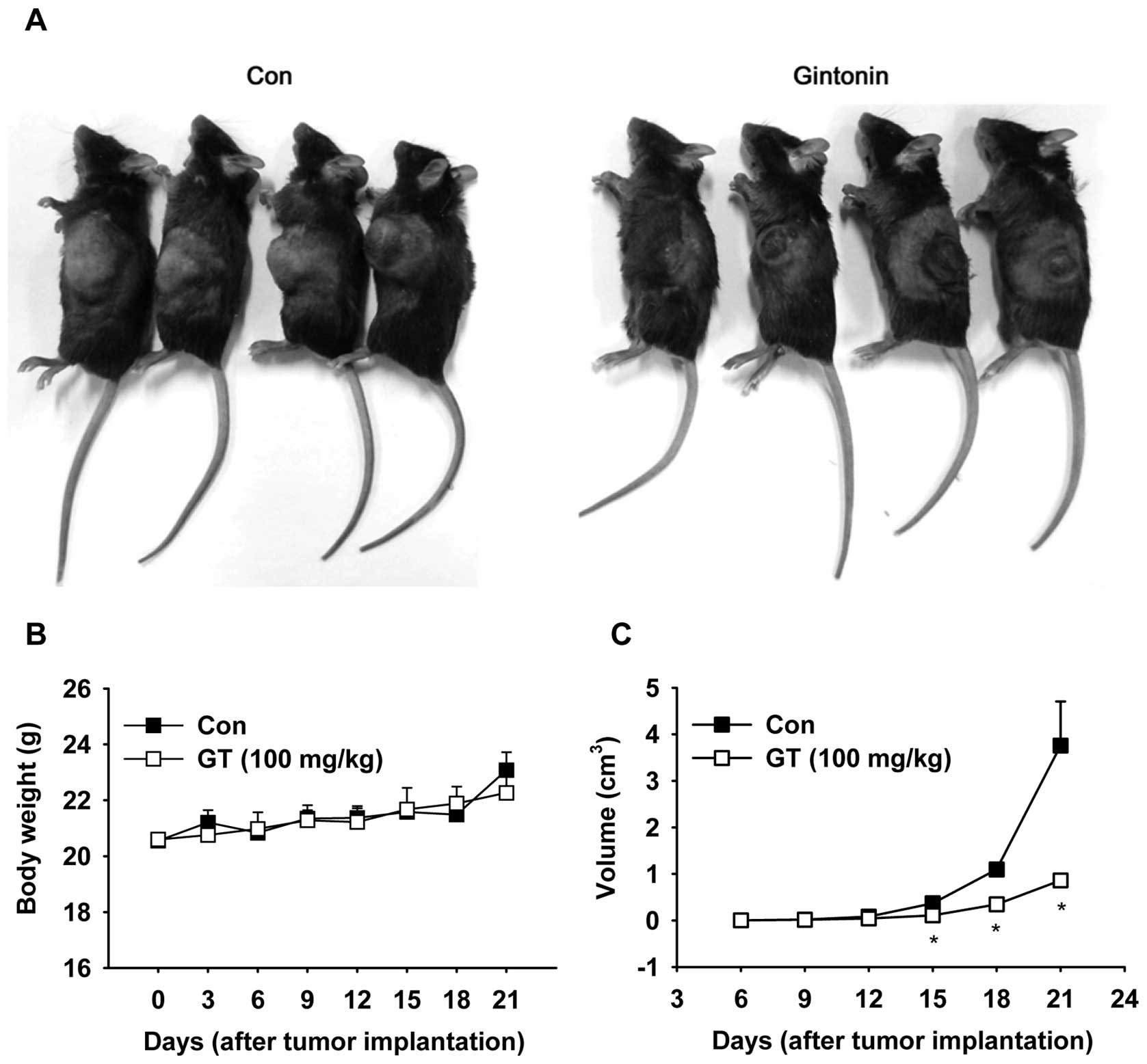|
1.
|
Moolenaar WH: LPA: a novel lipid mediator
with diverse biological actions. Trends Cell Biol. 4:213–219. 1994.
View Article : Google Scholar : PubMed/NCBI
|
|
2.
|
Mills GB and Moolenaar WH: The emerging
role of lysophosphatidic acid in cancer. Nat Rev Cancer. 3:582–591.
2003. View
Article : Google Scholar : PubMed/NCBI
|
|
3.
|
Chun J, Hla T, Lynch KR, Spiegel S and
Moolenaar WH: International Union of Basic and Clinical
Pharmacology. LXXVIII. Lysophospholipid receptor nomenclature.
Pharmacol Rev. 62:579–587. 2010. View Article : Google Scholar : PubMed/NCBI
|
|
4.
|
Kranenburg O and Moolenaar WH: Ras-MAP
kinase signaling by lysophosphatidic acid and other G
protein-coupled receptor agonists. Oncogene. 20:1540–1546. 2001.
View Article : Google Scholar : PubMed/NCBI
|
|
5.
|
Tokumura A, Majima E, Kariya Y, Tominaga
K, Kogure K, Yasuda K and Fukuzawa K: Identification of human
plasma lysophospholipase D, a lysophosphatidic acid-producing
enzyme, as autotaxin, a multifunctional phosphodiesterase. J Biol
Chem. 277:39436–39442. 2002. View Article : Google Scholar : PubMed/NCBI
|
|
6.
|
Umezu-Goto M, Kishi Y, Taira A, Hama K,
Dohmae N, Takio K, Yamori T, Mills GB, Inoue K, Aoki J and Arai H:
Autotaxin has lysophospholipase D activity leading to tumor cell
growth and motility by lysophosphatidic acid production. J Cell
Biol. 158:227–233. 2002. View Article : Google Scholar : PubMed/NCBI
|
|
7.
|
Houben AJ and Moolenaar WH: Autotaxin and
LPA receptor signaling in cancer. Cancer Metastasis Rev.
30:557–565. 2011. View Article : Google Scholar : PubMed/NCBI
|
|
8.
|
Stracke ML, Krutzsch HC, Unsworth EJ,
Arestad A, Cioce V, Schiffmann E and Liotta LA: Identification,
purification and partial sequence analysis of autotaxin, a novel
motility-stimulating protein. J Biol Chem. 267:2524–2529.
1992.PubMed/NCBI
|
|
9.
|
van Meeteren LA, Ruurs P, Christodoulou E,
Goding JW, Takakusa H, Kikuchi K, Perrakis A, Nagano T and
Moolenaar WH: Inhibition of autotaxin by lysophosphatidic acid and
sphingosine 1-phosphate. J Biol Chem. 280:21155–21161.
2005.PubMed/NCBI
|
|
10.
|
Zhang H, Xu X, Gajewiak J, Tsukahara R,
Fujiwara Y, Liu J, Fells JI, Perygin D, Parrill AL, Tigyi G and
Prestwich GD: Dual activity lysophosphatidic acid receptor
pan-antagonist/ autotaxin inhibitor reduces breast cancer cell
migration in vitro and causes tumor regression in vivo. Cancer Res.
69:5441–5449. 2009. View Article : Google Scholar
|
|
11.
|
Uchiyama A, Mukai M, Fujiwara Y, Kobayashi
S, Kawai N, Murofushi H, Inoue M, Enoki S, Tanaka Y, Niki T,
Kobayashi T, Tigyi G and Murakami-Murofushi K: Inhibition of
transcellular tumor cell migration and metastasis by novel
carba-derivatives of cyclic phosphatidic acid. Biochim Biophys
Acta. 1771:103–112. 2007. View Article : Google Scholar : PubMed/NCBI
|
|
12.
|
Gupte R, Siddam A, Lu Y, Li W, Fujiwara Y,
Panupinthu N, Pham TC, Baker DL, Parrill AL, Gotoh M, Murakami-
Murofushi K, Kobayashi S, Mills GB, Tigyi G and Miller DD:
Synthesis and pharmacological evaluation of the stereoisomers of
3-carba cyclic-phosphatidic acid. Bioorg Med Chem Lett.
20:7525–7528. 2010. View Article : Google Scholar : PubMed/NCBI
|
|
13.
|
Mochizuki M, Yoo YC, Matsuzawa K, Sato K,
Saiki I, Tono-oka S, Samukawa K and Azuma I: Inhibitory effect of
tumor metastasis in mice by saponins, ginsenoside-Rb2, 20(R)-and
20(S)-ginsenoside-Rg3, of red ginseng. Biol Pharm Bull.
18:1197–1202. 1995. View Article : Google Scholar : PubMed/NCBI
|
|
14.
|
Pan XY, Guo H, Han J, Hao F, An Y, Xu Y,
Xiaokaiti Y, Pan Y and Li XJ: Ginsenoside Rg3 attenuates cell
migration via inhibition of aquaporin 1 expression in PC-3M
prostate cancer cells. Eur J Pharmacol. 683:27–34. 2012. View Article : Google Scholar : PubMed/NCBI
|
|
15.
|
Pyo MK, Choi SH, Hwang SH, Shin TJ, Lee
BH, Lee SM, Lim YH, Kim DH and Nah SY: Novel glycolipoproteins from
ginseng. J Ginseng Res. 35:92–103. 2011. View Article : Google Scholar
|
|
16.
|
Hwang SH, Shin TJ, Choi SH, Cho HJ, Lee
BH, Pyo MK, Lee JH, Kang J, Kim HJ, Park CW, Shin HC and Nah SY:
Gintonin, newly identified compounds from ginseng, is novel
lysophosphatidic acids-protein complexes and activates G
protein-coupled lysophosphatidic acid receptors with high affinity.
Mol Cells. 33:151–162. 2012. View Article : Google Scholar
|
|
17.
|
Liu XW, Sok DE, Yook HS, Sohn CB, Chung YJ
and Kim MR: Inhibition of lysophospholipase D activity by
unsaturated lysophosphatidic acids or seed extracts containing
1-linoleoyl and 1-oleoyl lysophosphatidic acid. J Agric Food Chem.
55:8717–8722. 2007. View Article : Google Scholar : PubMed/NCBI
|
|
18.
|
Ferguson CG, Bigman CS, Richardson RD, van
Meeteren LA, Moolenaar WH and Prestwich GD: Fluorogenic
phospholipid substrate to detect lysophospholipase D/autotaxin
activity. Org Lett. 8:2023–2026. 2006. View Article : Google Scholar : PubMed/NCBI
|
|
19.
|
Poste G, Doll J, Brown AE, Tzeng J and
Zeidman I: Comparison of the metastatic properties of B16 melanoma
clones isolated from cultured cell lines, subcutaneous tumors and
individual lung metastases. Cancer Res. 42:2770–2778. 1982.
|
|
20.
|
Gaetano CG, Samadi N, Tomsig JL, Macdonald
TL, Lynch KR and Brindley DN: Inhibition of autotaxin production or
activity blocks lysophosphatidylcholine-induced migration of human
breast cancer and melanoma cells. Mol Carcinog. 48:801–809. 2009.
View Article : Google Scholar
|
|
21.
|
Clair T, Lee HY, Liotta LA and Stracke ML:
Autotaxin is an exoenzyme possessing 5′-nucleotide
phosphodiesterase/ATP pyrophosphatase and ATPase activities. J Biol
Chem. 272:996–1001. 1997.PubMed/NCBI
|
|
22.
|
Nam SW, Clair T, Kim YS, McMarlin A,
Schiffmann E, Liotta LA and Stracke ML: Autotaxin (NPP-2), a
metastasis-enhancing motogen, is an angiogenic factor. Cancer Res.
61:6938–6944. 2001.PubMed/NCBI
|
|
23.
|
Moore LD, Isayeva T, Siegal GP and
Ponnazhagan S: Silencing of transforming growth factor-beta1 in
situ by RNA interference for breast cancer: implications for
proliferation and migration in vitro and metastasis in vivo. Clin
Cancer Res. 14:4961–4970. 2008. View Article : Google Scholar : PubMed/NCBI
|
|
24.
|
Hwang SH, Rait A, Pirollo KF, Zhou Q,
Yenugonda VM, Chinigo GM, Brown ML and Chang EH: Tumor-targeting
nanodelivery enhances the anticancer activity of a novel
quinazolinone analogue. Mol Cancer Ther. 7:559–568. 2008.
View Article : Google Scholar : PubMed/NCBI
|
|
25.
|
Porstmann T, Ternynck T and Avrameas S:
Quantitation of 5-bromo-2-deoxyuridine incorporation into DNA: an
enzyme immunoassay for the assessment of the lymphoid cell
proliferative response. J Immunol Methods. 82:169–179. 1985.
View Article : Google Scholar : PubMed/NCBI
|
|
26.
|
Scudiero DA, Shoemaker RH, Paull KD, Monks
A, Tierney S, Nofziger TH, Currens MJ, Seniff D and Boyd MR:
Evaluation of a soluble tetrazolium/formazan assay for cell growth
and drug sensitivity in culture using human and other tumor cell
lines. Cancer Res. 48:4827–4833. 1988.PubMed/NCBI
|
|
27.
|
Scutti JA, Matsuo AL, Pereira FV, Massaoka
MH, Figueiredo CR, Moreira DF, Belizário JE and Travassos LR: Role
of SOCS-1 gene on melanoma cell growth and tumor development.
Transl Oncol. 4:101–109. 2011. View Article : Google Scholar : PubMed/NCBI
|
|
28.
|
Leberi MF and Efferth T: Molecular
principles of cancer invasion and metastasis (Review). Int J Oncol.
34:881–895. 2009.PubMed/NCBI
|
|
29.
|
Deng W, Shuyu E, Tsukahara R, Valentine
WJ, Durgam G, Gududuru V, Balazs L, Manickam V, Arsura M,
VanMiddlesworth L, Johnson LR, Parrill AL, Miller DD and Tigyi G:
The lysophosphatidic acid type 2 receptor is required for
protection against radiation-induced intestinal injury.
Gastroenterology. 132:1834–1851. 2007. View Article : Google Scholar : PubMed/NCBI
|
|
30.
|
Adachi M, Horiuchi G, Ikematsu N, Tanaka
T, Terao J, Satouchi K and Tokumura A: Intragastrically
administered lysophosphatidic acids protect against gastric ulcer
in rats under water-immersion restraint stress. Dig Dis Sci.
56:2252–2261. 2011. View Article : Google Scholar
|
|
31.
|
Xu X and Prestwich GD: Inhibition of tumor
growth and angiogenesis by a lysophosphatidic acid antagonist in an
engineered three-dimensional lung cancer xenograft model. Cancer.
116:1739–1750. 2010. View Article : Google Scholar : PubMed/NCBI
|
|
32.
|
Gierse J, Thorarensen A, Beltey K,
Bradshaw-Pierce E, Cortes-Burgos L, Hall T, Johnston A, Murphy M,
Nemirovskiy O, Ogawa S, Pegg L, Pelc M, Prinsen M, Schnute M,
Wendling J, Wene S, Weinberg R, Wittwer A, Zweifel B and Masferrer
J: A novel autotaxin inhibitor reduces lysophosphatidic acid levels
in plasma and the site of inflammation. J Pharmacol Exp Ther.
334:310–317. 2010. View Article : Google Scholar : PubMed/NCBI
|
|
33.
|
Albers HM, Dong A, van Meeteren LA, Egan
DA, Sunkara M, van Tilburg EW, Schuurman K, van Tellingen O, Morris
AJ, Smyth SS, Moolenaar WH and Ovaa H: Boronic acid-based inhibitor
of autotaxin reveals rapid turnover of LPA in the circulation. Proc
Natl Acad Sci USA. 107:7257–7262. 2010. View Article : Google Scholar : PubMed/NCBI
|
|
34.
|
van Meeteren LA, Brinkmann V,
Saulnier-Blache JS, Lynch KR and Moolenaar WH: Anticancer activity
of FTY720: phosphorylated FTY720 inhibits autotaxin, a
metastasis-enhancing and angiogenic lysophospholipase D. Cancer
Lett. 266:203–208. 2008.PubMed/NCBI
|















